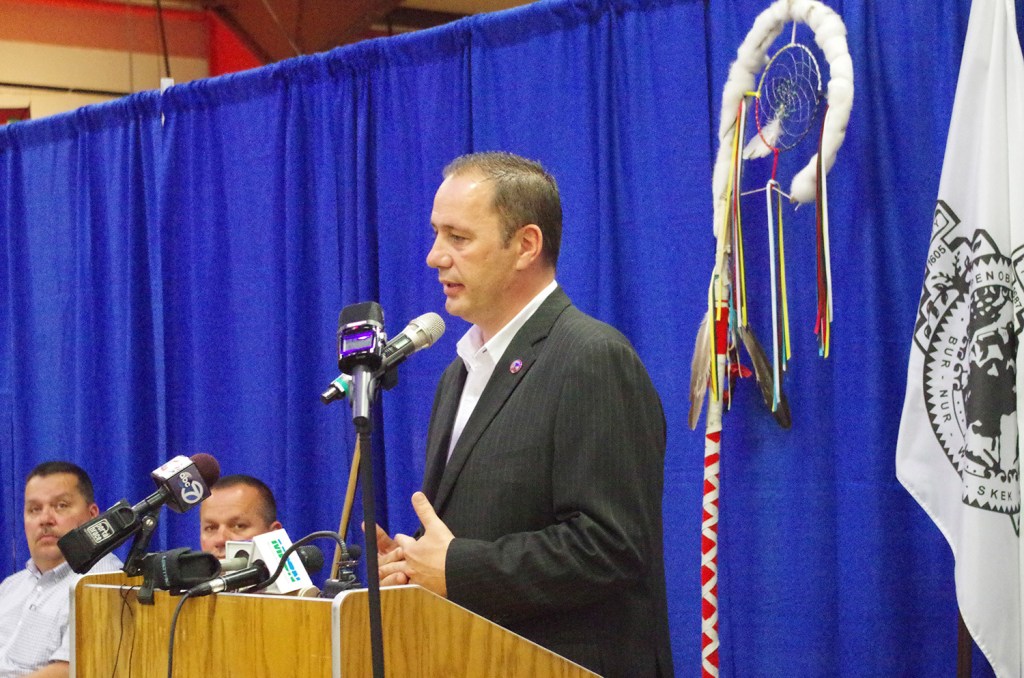INDIAN ISLAND – A day after withdrawing their representatives from the Maine Legislature, three of the state’s four Indian tribes resolved Wednesday to no longer recognize the authority of state officials, legislators and courts to “define our sovereignty or culture or to interfere with our self-governing rights.”
The three tribes also called on the federal government to intervene in their increasingly heated disputes with Gov. Paul LePage and Attorney General Janet Mills over the meaning of the Maine Indian Claims Settlement Act of 1980, asking for a congressional inquiry. In a joint declaration, they asked for a “review of the actions of Maine that have resulted in a diminishment of our rights as federally recognized, sovereign Indian troes and of the adverse impacts upon our cultures, rights and resources.”
The tribal leaders acknowledged that the move is largely symbolic, and they could not come up with any examples of laws they might ignore as a result. The declaration was signed at a press conference on the Penobscot reservation Wednesday afternoon by Penobscot Nation chief Kirk Francis, chief Edward Peter-Paul of the Aroostook Band of Micmacs, and Passamaquoddy chiefs Fred Moore and William Nicholas, who represent the Pleasant Point and Indian Township reservations.
“The Maine Indian Land claims Setlement act has failed and we cannot allow ourselves to continue down the path,” Chief Francis said after the signing ceremony, which was held in the Penobscots’ cavernous bingo hall. “We’re saying it’s a failed social experiment and it has a negative effect on people from a health care standpoint, from an economic standpoint, from all of those things.”
Under the historic 1980 settlement acts, Maine and tribes negotiated a compromise to avoid a legal battle over the tribes’ claim to more than half of Maine’s territory. The tribes accepted broad state authority and jurisdiction, except over “internal tribal matters” and certain other issues, but the parties have clashed over its interpretation and implementation.
“You can’t have one party to an agreement seize total control of it,” Francis said. “Our problem is we have no third party dispute resolution mechanism in this state… The US Congress with plenary authority over Indian tribes and being a signatory to the agreement is the rightful place to handle this.”
The move came one day after the Passamaquoddy and Penobscot representatives to the state legislature renounced their seats in protest over the deterioration in tribal-state relations. Tribal representatives can introduce bills and participate in the committee process, but their votes are not counted on the House floor.
Wednesday’s declaration won’t have much practical impact. Asked if there were any laws that might be ignored or cooperative ventures between the state and tribes that would be severed as a result of the declaration, Francis said he had previously put thought into that and could not think of any.
“There really has been no meaningful changes in how the state views the Indian settlement act [since 1980], so I really can’t come up with one thing that would [change] for us in terms of the relationship,” he said.
LePage’s office did not respond to a request for comment. Francis told the audience of several dozen at Indian Island that the tribes had not heard from the governor since their legislators walked out of the State House on Tuesday.
In a prepared statement late Wednesday, the Attorney General’s Office said, “Maine’s tribes gained a great deal of autonomy and self-governance in the 1980 Settlement Acts, as well as land, money and a significant revenue stream from the state and the federal governments to assist in self-governance and to provide for the health, safety and education of tribal citizens. The state retained broad regulatory authority over the natural resources of the state. The state and its various agencies have worked with the tribes and their representatives on a number of specific issues, including broad fishing rights, expanded tribal court jurisdiction, place name regulations, university tuition waivers, and enforcement of the Indian Child Welfare Act. This Office remains available and willing to work with any tribe, tribal representative or tribal member to address their specific concerns, while defending the lawsuit brought by one tribe over the use and jurisdiction of the Penobscot River and while enforcing state laws designed to preserve natural resources such as elver fisheries.”
In their declaration, the tribes charged that the state has repeatedly encroached on their sovereign powers, land and resources, seeking “to perpetuate us as wards of the State of Maine.” They said Maine’s attempts to block the implementation of federal legislation meant to assist Native Americans – including those allowing tribal casinos – amounted to interference in their relationship with their federal trustees.
A fourth tribe, the Houlton Band of Maliseets, did not participate in Wednesday’s join declaration. Their legislative representative, Henry Bear, told the Press Herald his instructions were to continue representing the tribe in the State House.
The Penobscots and Passamaquoddy are locked in disputes with the state over saltwater fishing rights, tribal jurisdiction over domestic violence cases by non-Indians on their reservations, and land use regulation on the tribe’s extensive, off-reservation trust lands.
The Penobscot Nation has also sued the Maine Attorney General’s Office in federal court over the state’s assertion that the tribe has no special rights in the main stem of the river that bears its name; the federal government has sided with the tribes in the dispute.
LePage last month took the unusual step of issuing an executive order rescinding his own 2011 order directing state agencies to seek cooperation with the tribes.
Chief Moore of the Pleasant Point Passamaquoddy said that, despite the resolution, the tribes intended to cooperate with state authorities in certain areas, including the resolution of fishing disputes.
“We have committed to sitting down with state officials to explore ways in which we may be able to work together for the benefit of all people,” he said.
Send questions/comments to the editors.


